The fifth episode of Marvel’s third Disney+ series wraps up many of Loki’s character arcs and prepares us for the crazy new MCU content we’re going to get in the finale.
To start: it appears that Loki and Sylvie’s titular Nexus Event from S1E4 was not just a potential romantic connection, but their choice to not be alone.

“Journey into Mystery” dropped us into the Void, a place at the end of time where all pruned people and timelines are abandoned after being taken by the TVA. Our Loki woke up their after “The Nexus Event”’s end credits, and was rescued by four other Lokis—Classic Loki (Richard E. Grant) in the full comic getup; Boastful Loki (DeObia Oparei), who, while seemingly more successful than Hiddleston’s Loki, seems still caught up on the prospect of a throne; Kid Loki (Jack Veal), whose Nexus Event was killing Thor; and, MOST importantly, Alligator Loki (affectionately, if incorrectly, nicknamed “Croki” by the fandom), who is Loki as a very small alligator.
The one thing all the Lokis seem to have in common is loneliness—Sylvie has been alone since childhood in order to survive, Classic Loki escaped Thanos in his timeline and isolated himself to avoid hurting others, Kid Loki killed his Thor. Classic Loki even says it when Loki’s rescuers take him to their underground hideout.
“Because we, my friends, have but one part to play: The God of Outcasts.”
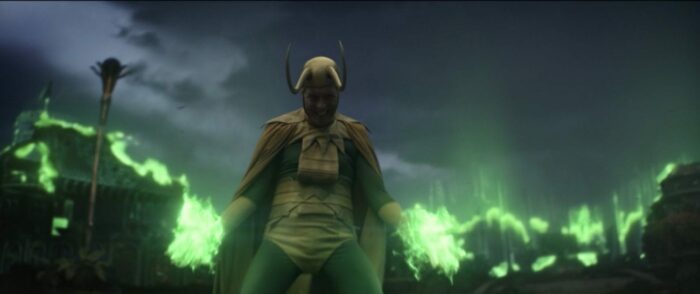
Grant absolutely steals the show as Classic Loki with an almost Shakespearean performance that’s as bold and funny as it is heartbreaking. When Classic Loki sacrifices himself at the end of the episode to allow Sylvie and Loki to enchant Alioth (the enormous stormcloud-beast that guards the Void), he shows himself to be the most accomplished magician of the Lokis as he projects an enormous image of Asgard into the Void. It’s a fantastic scene visually and thematically as Classic Loki is given a chance to redeem himself to his fellow variants.
The only bummer to come out of this new collection of Lokis is the show’s decision to not include any other women or non-binary Gods of Mischief. The show quickly stepped on Loki’s genderfluid identity (that they were supposedly so excited to explore) as Loki asks the other variants in the void if they’re ever met a woman version of Loki and they all act with surprise and disbelief. Classic Loki goes so far as to say “that sounds terrifying!” …which means that in essentially no other timeline than Sylvie’s is Loki a woman.
It’s rather disappointing to see the MCU project its understanding of genderfluidity as “well maybe in one alternate universe I could have been born female,” rather than exploring what the identity actually means—and what Loki has been in the comics—that of a single person who identifies sometimes as one particular gender and sometimes identifies as other genders.
It’s also worth noting that all of the Lokis aside from Boastful Loki were white. Like… Y’all… Come on. He’s a shapeshifter. He could be literally anybody, and 99% of them were white guys?
Loki, Classic Loki, Kid Loki, and Croki escape the hideout when it is invaded by (fan-dubbed) “President” Loki (yes, the one from all the ads) and his army of other Loki variants, who were given the location by Boastful Loki in exchange for the “throne.” President Loki attempts to double-cross Boastful Loki, and is, instead, double-crossed by his variant army, resulting in a goofy, massive brawl between dozens of Lokis. (And an excellent moment as Croki bites Pres. Loki’s hand clean off.)
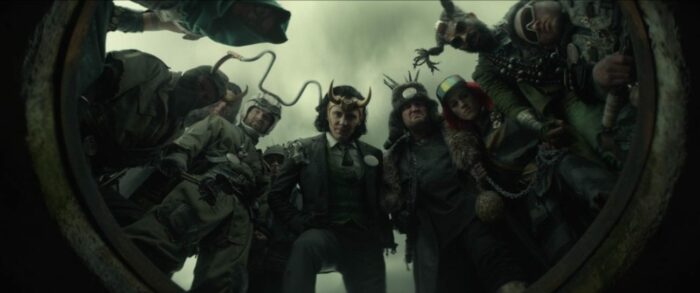
Our Loki seems first confused, then embarrassed, then angry at this crowd of “selves” he’s found himself in. He calls them all “monsters,” a term he applied to himself readily in Thor when Odin told him first of his true parentage, and something many fans see as a token of his childhood trauma.
“This is a nightmare.”
Loki’s exclamation upon seeing his President-self’s mob of variants is played a bit for laughs, but you can see Loki’s pain in Hiddleston’s performance. His worst nightmare is being trapped with himself, because deep down he still doesn’t actually like himself. Just when he was beginning to change, just when he started to love Sylvie and express that love to himself in return (“The Nexus Event”), he was sent back (physically and metaphorically) to the start of his character journey.
These Lokis are stuck in a loop of character development—they’re fighting pettily for the throne and nothing else. Our Loki finally escaped that loop by learning to love himself and others and to seek greater things outside of that cycle of pain that he learned as a child was the only thing that could lead to his worth. He learned his worth lies with a place in the world, not ruling it.
He has grown past the trauma-induced narcissism that Mobius taunted him for from Episode 1 to Episode 4.
Speaking of Agent Mobius M. Mobius (Owen Wilson), I’m sure I wasn’t the only viewer who was greatly relieved by the appearance of our favorite TVA agent in the Void. After Sylvie (Sophia Di Martino) prunes herself in an attempt to rescue Loki in the Void, she is rescued from Alioth by Mobius in a pizza delivery car.
Mobius gets some great moments in this episode as he essentially provides therapy for the other four Loki variants he meets. His own decision to abandon the TVA is potentially the reason Classic Loki makes the choice to save Sylfie and Loki at the end of the episode:
Classic Loki: So just like that, you’re turning on the very thing you devoted your life to.
Mobius: Well, it’s never too late to change.
When Mobius parts ways with Sylvie and Loki at the end of the episode, he quotes Loki’s Episode 1 intention to burn the TVA “to the ground.” Loki rejects Mobius’s extension of a handshake and pulls him into an embrace instead.

Again, we see Loki teary-eyed at the thought of losing Mobius, though hopefully this parting will be temporary.
Sylvie and Ravonna Renslayer (Gugu Mbatha-Raw) kick off “Journey into Mystery” after the opening credits where they left off in “The Nexus Event,” as Sylvie demands Ravonna explain who’s actually behind the TVA and what they want. It seems like Ravonna might know more than she’s letting on, as she lies through her teeth to Sylvie (with tears in her eyes and everything!) in an effort to play for time as TVA agents approach.
Ravonna makes a perfect villainous match for all the Lokis. While perhaps a more obvious liar than the God of Mischief, the audience is still a bit up-in-the-air as to her true intentions (much like we used to be with Loki) and her potential connections to the creator of the TVA. Mbatha-Raw’s performance is captivating as she slides from feigned innocence to cold double-cross. Her little smirk after attempting to manipulate Miss Minutes into offering up information on the formation of the TVA is going to live on forever in my heart.
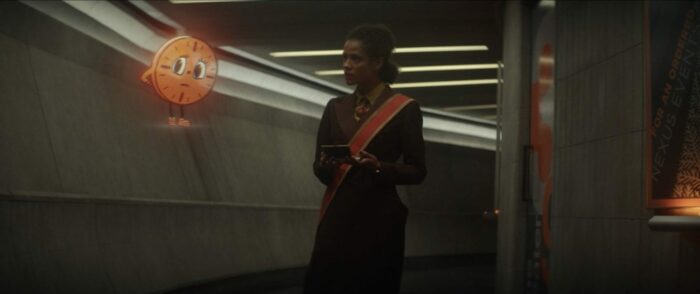
Many fan theories have been popping up about the potential introduction of Marvel villain Kang the Conqueror, as he is Ravonna’s boyfriend in the comics and has already been confirmed (and cast) as a character in the upcoming third installment of the Ant-Man franchise (Ant-Man and the Wasp: Quantumania).
Unfortunately it seems that my prediction that this episode would center more on Sylvie, Ravonna, and B-15 was mostly incorrect. B-15 was, yet again, maligned to a lesser role than her fellow characters and has yet to be given the level of personality or backstory that they have as well.
Actress Wunmi Mosaku made the most out of her one scene with Gugu Mbatha-Raw as Ravonna interrogated an imprisoned B-15 for information on Sylvie’s motivations. Mosaku showed a more genuine, earnest side to the TVA agent that we’d started to crack open in “The Nexus Event.” While I hope they’ll expand more on her character in Episode 6, or carry her over into future MCU projects, the prospect seems unlikely.
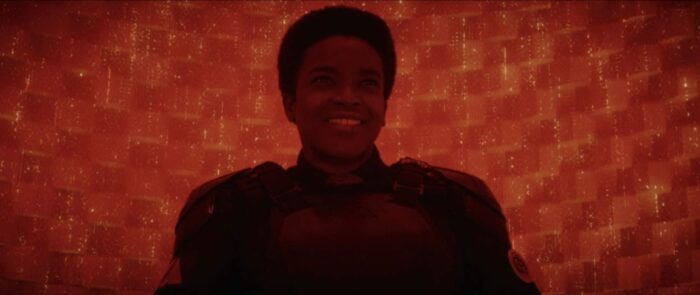
And now, the moment we’ve all been waiting for: it’s time for the multiverse.
Marvel’s choice to begin canonizing the Multiverse is both brilliant creatively and a perfect thematic tie-in to Loki and its characters.
When Sylvie and Mobius have their first heart-to-heart as he rescues her from Alioth, he explains to her why the TVA agents are so willing to go along with acts of brutal violence against variants like Sylvie.
“Well, I guess when you think the ends justify the means, there’s not much you won’t do.”
It’s a metaphor for Loki himself—cycles of trauma and violence only create more trauma and violence. The only way to separate yourself from that is to break the cycle. It also answers Marvel’s subtextual question about villainy that was asked the moment they announced this show.
There are no actual villains. Loki allows us inside the minds of so many people who would, in any other black-and-white narrative, be “the bad guy.” Loki himself, Sylvie, Ravonna, the Time Keepers. Two became our protagonists because we gave them a chance to grow, one is confused and looking for her life’s purpose, one wasn’t real to begin with.
In the MCU, the answer is chaos. As we tie the canonization of a multiverse into Loki, WandaVision, and Doctor Strange in the Multiverse of Madness, we are both given tremendous opportunity for creative freedom and unlimited stories, but also a reminder of a simple truth—everyone thinks they’re the hero in their own story.
There are a million different ways that any situation in day-to-day life could work out because people are complex. They make good choices and bad choices and choices that are neither. We ourselves are capable of multitudes of different lives. Loki is capable of a million different lives. He never had to be a villain.
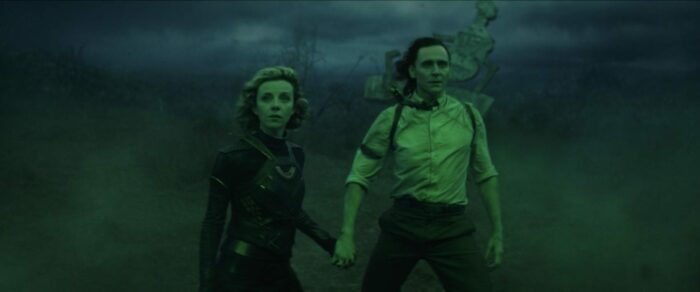
Maybe Loki was never successful because he was only fighting for himself, like Sylvie was. It would explain why Loki’s greatest successes came when he was willing to work with Thor—he wasn’t alone. He could step in as the protagonist of his own story and everyone else’s.
Sylvie: “I dont have friends… I don’t have anyone.”
Loki: “There are more important things, right?”
Sylvie: “Right? Yeah. Like bringing down the TVA!”
It’s both an incredible narrative/character choice and a calculated creative decision on Marvel’s behalf. Where better to introduce upcoming properties like What If…? than through the life of the God of Mischief?

Before going their separate ways, Kid Loki conjures our Loki a dagger. It reflects drunk-Loki’s mangled metaphor that he offers Sylvie in “Lamentis,” that love is “an imaginary dagger” that causes harm and is never really there. As Loki wields this very real weapon at Alioth, I couldn’t help but think: Love really is an imaginary dagger, and he accepted it from himself.

